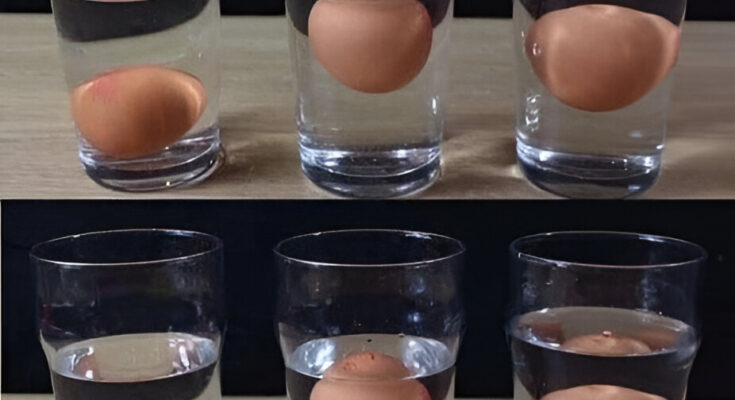Checking the Packing Date

Credit: Shutterstock
Not to be confused with the expiration date, the packing date (printed in Julian format on the carton) offers a more accurate gauge of freshness. Typically, eggs remain good to eat for four to five weeks after their packing date if they’ve been stored correctly. However, it’s recommended to consume them within three to five weeks of purchase to ensure optimal quality.
The Float Test

A tried-and-true method, the float test provides insight into egg freshness based on air pocket size. Older eggs develop larger air pockets, which makes them float. To do the test, simply put your eggs in water. If they sink and lay flat, they’re fresh. If they stand upright at the bottom of the water it’s past their prime and if they float you need to either use it quickly or dispose of it.2 If you can’t remember if it’s been 5 weeks or more, err on the side of caution.
Using Your Senses

Credit: Shutterstock
Beyond the float test, you can also use smell, sight, and touch to see how your eggs are doing. Your sense of smell, for example, can be a powerful tool in assessing egg freshness. Fresh eggs usually have a neutral or grassy scent. However, if an egg emits a foul or sulfur-like odor, it’s a clear sign of spoilage. A quick sniff before cracking can help you avoid using bad eggs. For touch, shaking an egg can be helpful to detect any changes in consistency. Fresh eggs produce very little sound when shaken, while spoiled eggs may slosh or sound watery. Those air pockets we check for in the float test give the contents inside more room to slosh around. Visual cues can also indicate egg spoilage. Cracked or damaged shells create pathways for bacteria, while unusual discolorations signal potential issues. Additionally, any visible dirt or foreign substances on the shell should be promptly disposed of. While these tests aren’t as heavily endorsed by experts as the float test, they can provide additional confirmation of egg quality.
It’s a Process

Credit: Shutterstock
Egg production methods play a heavy role in determining quality. Free-range eggs, for example, come from hens with access to outdoor space, which helps promote natural behaviors and can potentially impact freshness. A hen that isn’t under constant stress about pumping out eggs certainly would have differences in egg quality, right? Well, that’s what the experts think, and it’s a pretty compelling argument (as well as keeps PETA off their backs). Familiarizing yourself with the different methods eggs are produced can help you make more informed choices about your egg purchases.
Avoid Disappointment!

Credit: Shutterstock
Ensuring egg freshness is crucial for maintaining food quality and safety in the kitchen. By employing various methods such as the float test, the smell test, and a visual inspection, you can confidently assess your egg’s quality. Additionally, understanding production methods will provide valuable insight into what factors would influence your egg’s freshness. With these tools at your disposal, you can enjoy eggs at their peak and avoid the disappointment of spoiled ingredients.



